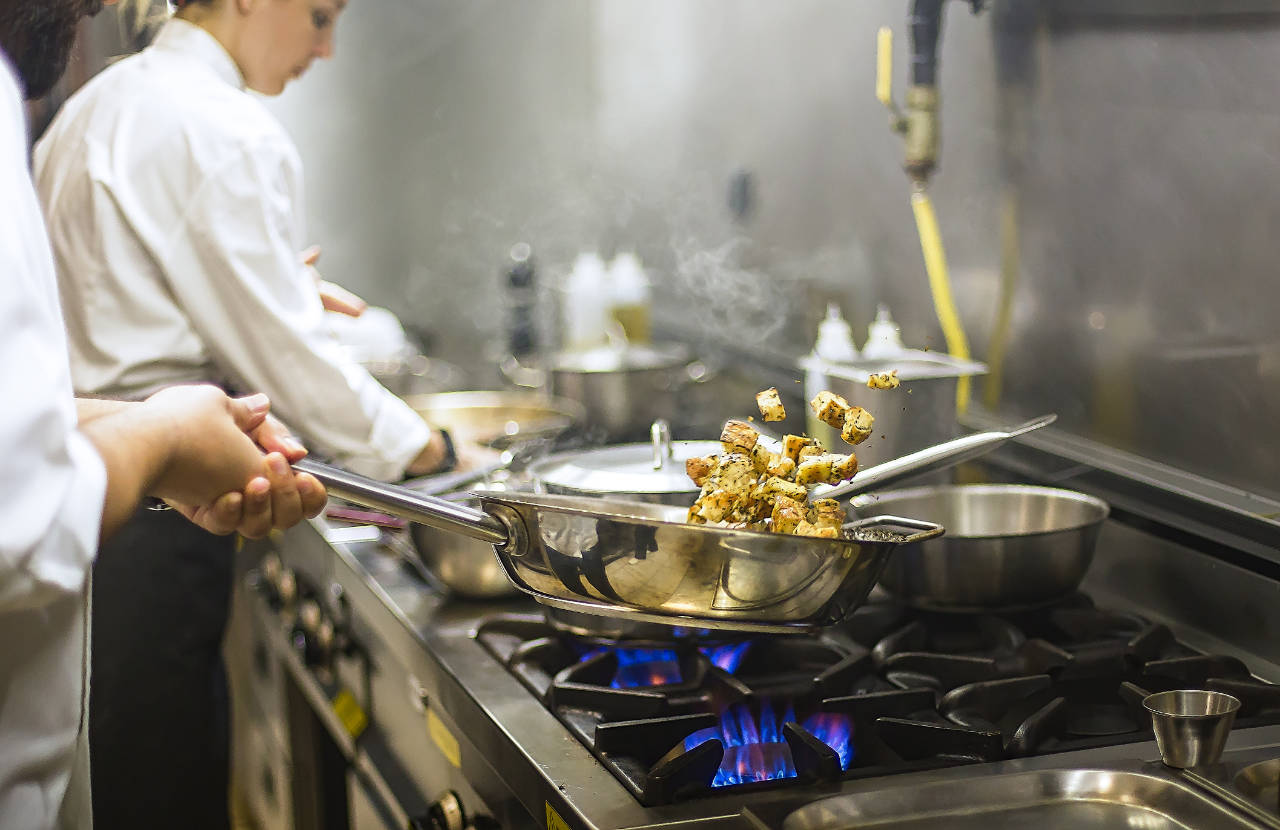
Health and safety management is essential for every organisation, but it is vital for hospitality organisations in particular. Commercial kitchens and restaurants, cafes and bars have numerous hazards that when not managed effectively may result in injury, harm, business interruption or fatality.
From incidents such as slips and trips, cuts from knives, burns and scalds from cooking to unsafe food preparation, storage, and labelling – the potential for a workplace injury and ill-health is high without proper restaurant health and safety training.
Why restaurant health and safety legislation is important
The UK restaurant and bar sector employs more than 480,000 individuals and had an annual turnover of £8 billion according to research by IBISWorld. Food and drink organisations are important contributors to the UK’s social, economic and financial growth, making the health and safety of the employees, contractors, consumers and others essential.
All organisations must follow the rules and legislation around health and safety, including fire safety. Hospitality organisations must follow additional guidance on food and restaurant health and safety, such as allergens and the use of chemicals. It’s crucial as an employer in the hospitality sector to implement adequate management and employee training to ensure compliance.
Managing the health and safety training of employees will benefit your organisation in several ways, including:
- Reducing accidents and sick days.
- Ensure consistent approaches to risks by employees.
- Reducing the risk of accidents and ill health.
- Reducing the risk of harming your customers.
- Avoiding fines, closure of premises and reputational harm.
Key legislation for restaurant health and safety
Many aspects of kitchen health and safety rules reflect common sense, and you may already maintain good working practices. It is important to understand all the health and safety requirements for your organisation and have procedures in place to ensure the health and safety of employees and customers through undertaking a comprehensive risk assessment process.
And it isn’t just food-related health and safety requirements. Hospitality organisations need to meet a range of compliance regulations, such as fire safety, licensing and food safety.
Here are some of the key restaurant health and safety factors that apply to hospitality organisations.
Fire safety
Risk assessments and fire safety awareness are crucial for the protection of your organisation, employees and customers. Government figures show over 1,900 fires occurred in hospitality venues in 2019/2020.
The Regulatory Reform (Fire Safety) Order 2005 is the key legislation covering fire safety. The law requires that the person responsible for the premises, such as a landlord or occupier, must take reasonable steps to reduce the risk from fire and ensure people can safely evacuate in the event of an incident.
If you’re responsible for a food organisation such as a restaurant, bar, cafe or takeaway, you must ensure the premises meet fire safety requirements needed by conducting a suitable and sufficient fire risk assessment (FRA) by someone who is competent, which needs to be reviewed regularly. You must also provide your employees with adequate fire safety training.
Learn more about our IOSH Approved Fire Safety training and training for Fire Marshals and Wardens.
Slips, trips and falls
The Health and Safety at Work Act 1974 gives employees and the public the right to be protected from workplace-related risks.
Slips, trips and falls are some of the most frequent causes of injury in the hospitality industry. There are various precautions you can take as an employer to avoid these accidents. Precautions can be as simple as mopping up spills as soon as they happen and putting up wet floor signs to replacing loose flooring. Employers can minimise accidents by training employees on health and safety measures and following the correct procedures to prevent accidents.
Our IOSH Approved Slips, Trips and Falls training will help identify hazards in the workplace and what precautions to take.
Manual handling
Around a third of food and drink industry injuries is a result of manual handling. Back injuries are the most common, with 60% of the injuries resulting from lifting heavy objects. Employers must follow the Manual Handling Operations Regulations 1992 to avoid, assess and reduce manual handling risks.
Training, such as our Manual Handling Awareness course, can teach employees how to lift and move loads correctly to prevent injury risk.
Knives
Employers must keep their employees and consumers safe under the Health and Safety at Work etc. Act 1974.
Knife injuries in the hospitality industry are extremely common. Employees must be appropriately trained for the use of knives and similar equipment. Knife handling techniques, as well as best practice with storage and sharpening, should be taught. Adequate equipment should be available for safe use, such as chopping boards and PPE.
Chemicals
Chemicals used in the restaurant and catering kitchen for cooking and cleaning can be hazardous.
The Control of Substances Hazardous to Health 2002 (COSHH) regulations state employers must prevent and reduce employee exposure to dangerous or toxic chemicals. Maximising safety procedures include ensuring employees are trained in the use of chemicals, how to store hazardous substances correctly, what to do if they are exposed to a substance and that the correct PPE is worn when handling toxic or harmful substances.
COSHH training is essential for your organisation, and employees must complete mandatory training.
Food safety
Food safety and hygiene is crucial for restaurants, cafes and bars.
The Food Safety Act 1990 includes details such as how food should be prepared safely and labelled correctly, and that good hygiene practices should be carried out by everyone in the organisation, according to the Food Hygiene Regulations 2013. A Hazard Analysis and Critical Control Point (HACCP) must be completed and that even includes beer which is defined as a food. A food hygiene inspection checklist should be completed as part of the procedure, including food handling, storage and hygiene such as handwashing and allergen awareness.
Food safety training should be provided to all employees working in food storage, preparation or service.
Allergens
Food and hospitality organisations need to comply with the Food Information Regulation 2014.
The law requires that food organisations correctly label and provide accurate allergen information on all products, whether made on-site or prepackaged and sold. Organisations must train their employees correctly in food allergy awareness to provide consumers with accurate information about the products they produce, process, provide or sell. Employees must be made aware of the main allergens and the steps required to avoid cross-contamination.

Adam Clarke
Managing Director (Consulting)
